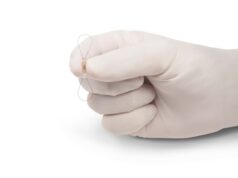 Orchestra BioMed Holdings has announced the first patient was randomised in the BACKBEAT pivotal study in late December 2023.
Orchestra BioMed Holdings has announced the first patient was randomised in the BACKBEAT pivotal study in late December 2023.
The BACKBEAT pivotal study will evaluate the efficacy and safety of atrioventricular interval modulation (AVIM) therapy (also known as BackBeat CNT), for the treatment of pacemaker-indicated patients with uncontrolled hypertension despite the use of antihypertensive medications.
AVIM therapy is an investigational patented bioelectronic therapy, administered using a standard dual-chamber pacemaker, designed to immediately, substantially and persistently reduce blood pressure.
Orchestra BioMed and Medtronic formed a strategic collaboration for the development and commercialisation of AVIM therapy for hypertensive pacemaker patients in July 2022. If approved, Medtronic will have exclusive global rights to commercialise AVIM-enabled pacing systems for this target population, and Orchestra BioMed will share in the revenues generated from Medtronic sales of the AVIM-enabled pacing systems.
“Our collaboration with Orchestra BioMed will explore how cardiac pacing can go beyond management of bradycardia and conduction disease to treat hypertension as well,” said Robert C Kowal, vice president and general manager of Cardiac Pacing Therapies within the Medtronic Cardiac Rhythm Management operating unit. “Our goal is to deliver the best possible outcomes for patients; this study will help us understand the potential role of AVIM therapy in treating hypertension, a major source of cardiovascular illness and a comorbidity in more than 70% of patients receiving pacing therapy.”
Suman Pasupuleti from Citrus Cardiology Consultants (Inverness, USA), the first site to randomise a patient in the BACKBEAT pivotal study, commented: “Blood pressure management with currently available treatments is especially challenging in many elderly patients who also are prone to side effects from medications. This leaves a gap in the care of these patients and increases their risk for heart attack, stroke and heart failure progression. We are excited to be among the first to enrol patients in the BACKBEAT study, which will evaluate the efficacy and safety of this therapy in patients with high blood pressure who also need pacemakers.”
“We are thrilled to announce the initiation of the BACKBEAT pivotal study. This is an essential milestone as we evaluate how this therapy may benefit pacemaker patients who confront the mortality and morbidity risks of elevated blood pressure,” commented David Hochman, chairman, chief executive officer and founder of Orchestra BioMed. “We have activated multiple clinical sites and are screening patients in the USA and Europe. We are grateful to the clinical sites, our team and Medtronic for their dedication to finalizing all the study initiation deliverables. Most importantly, we are thankful to the patients who will participate in this landmark study.”
The BACKBEAT pivotal study is a global, multicentre, prospective, randomised, double-blind study investigating the efficacy and safety of AVIM therapy in patients who have recently undergone implantation of a Medtronic dual-chamber cardiac pacemaker and have uncontrolled hypertension despite the use of antihypertensive medications.
Orchestra BioMed is actively screening patients for enrollment in the BACKBEAT pivotal study. Site activations are expected to continue throughout 2024 with a target of activating approximately 80 centers in the USA and Europe. The study will randomise approximately 500 patients 1:1 to AVIM therapy combined with continued medical therapy (treatment) or continued medical therapy and standard pacing alone (control). The study’s primary efficacy endpoint will determine at three months post-randomization whether AVIM-treated patients experience a statistically significant reduction in daily average blood pressure (mean 24-hour ambulatory systolic blood pressure or [aSBP]) as compared to control patients.
The primary safety endpoint will determine at three months post-randomisation whether AVIM-treated patients experience serious adverse device effects that are not anticipated with cardiac pacing. Double-blind follow up will continue through 12 months to enable the collection of additional clinical endpoints. All patients will be eligible to cross over upon completion of the 12-month blinded follow-up phase.










